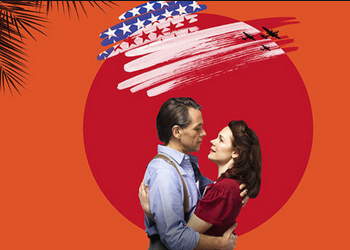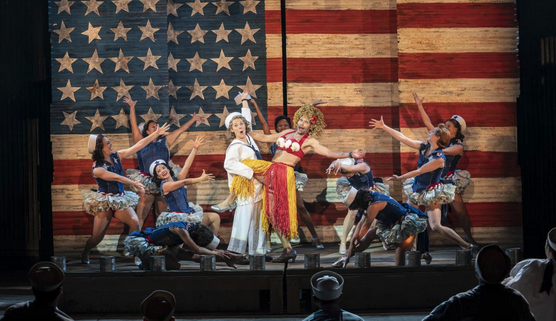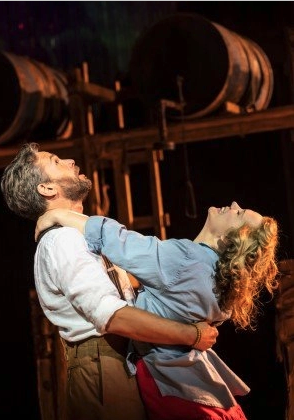While it is sadly premature to say that the theatre is fully back from its enforced hibernation of the last 15 months that put paid entirely to last summer’s Chichester Festival Theatre season, it was a (socially distanced) delight to welcome back of my favourite regional theatres with the opening, at last, of its production of South Pacific originally planned for last year.

It’s an even bigger personal bonus that the theatre is now right on my doorstep — it’s the closest theatre to where I have now moved, as I’m now living in a tiny village on the South Downs, about ten miles from Chichester. Though its proximity was not the reason I chose this village, it’s a particular treat to have it as my new local: a bit of a change from having the Menier and Southwark Playhouse as my nearest “home” theatres.
Even if this was not the case, it was still a homecoming for everyone else in the theatre on opening night: the roar of sustained applause as the lights dimmed told you, if you needed to be told, just how much it has been missed, and how pleased we were to be back in its warm embrace.

Of course Rodgers and Hammerstein’s 1949 warhorse, in every sense, of a musical is a show that hugs the audience close already; with its enveloping sweep of wall-to-wall gorgeous melodies, it is impossible not to melt into its arms. Just as hick navy nurse Nellie Forbush, from Little Rock, Arkansas, can’t resist falling into the arms of French planter Emile de Becque, who lives on the South Pacific island that she has been deployed to.
But director Daniel Evans refuses to indulge its overpowering romanticism at the expense of its drama; sure, it is a show about finding love, but the book — by Oscar Hammerstein II and the show’s original director Joshua Logan — embeds it in a gritty story that confronts the inbuilt racism that Nellie has to overcome, while another young army lieutenant comes to his own powerful awakening about these powerful impulses, as he himself falls in love with a young Polynesian woman.
As Rob Houchen beautifully and fiercely sings as Lt Joseph Cable, with a mixture of clarity and rage,
“You’ve got to be taught to be afraid
Of people whose eyes are oddly made,
And people whose skin is a diff’rent shade,
You’ve got to be carefully taught.You’ve got to be taught before it’s too late,
Before you are six or seven or eight,
To hate all the people your relatives hate,
You’ve got to be carefully taught!
It’s a truly wonderful song, and the show’s most powerful message, still startlingly relevant today, 72 years on from when it was written, as witness the online abuse directed at Britain’s black football players at Sunday’s Euro 2020 finale.
But for all that, this is not a didactic show; it conveys its message by stealth and winning your heart as well as your mind.

And the same is true of Evans’s production, stunningly designed to fill Chichester’s large circular stage with an unfolding series of alternately beautiful and gritty stage pictures by designer Peter McKintosh. Choreographer Ann Yee supports it with wonderfully drilled choreographic moments of marching nurses and soldiers, but most especially by turning Sera Maehara’s delicate Liat — the daughter of Joanna Ampil’s fiery Bloody Mary, a Polynesian wheeler dealer — into an expressive dancer who, unable to speak English, conveys her feelings entirely in dance.
That’s just one surprising invention of the production. It is also thrilling to find such underdeveloped characters, at least as scripted, as Keir Charles’s Luther Billis, Ampil’s Bloody Mary and David Birrell’s Captain Brackett register as fully-realised life forces, not just comedic or dramatic diversion.

By animating those supporting roles so vividly, director Daniel Evans allows his leads to really flower; everyone is so real, it makes Gina Beck’s enchanting and poignant Nellie Forbush and Julian Ovenden’s gloriously sung de Becque (pictured above) capture the heart as seldom before.
While the National’s 2001 revival starred Lauren Kennedy and a spectacular Philip Quast as Nellie and de Becque respectively, Trevor Nunn’s production was rather broad and over-emphatic; Evans makes it altogether more realistic and therefore heartfelt.
With a score that includes “A Cockeyed Optimist”, “I’m Going to Wash that Man Right out of My Hair”, “There is Nothin’ Like A Dame”, “Younger than Springtime”, “Happy Talk” and “This Nearly Was Mine”, this is one of the evergreen musicals; and another acts doubles as a judgement for the show: “Some Enchanted Evening.” It is utterly joyous and joyful.
